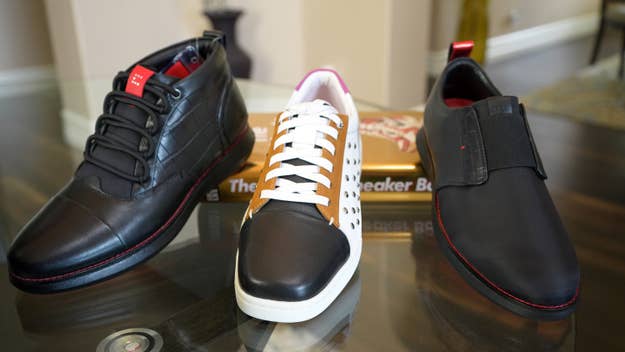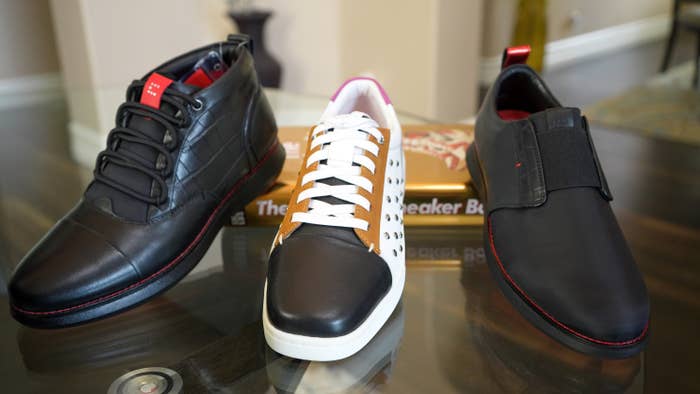
Gentry Humphrey—the former Nike exec who was there for the genesis of Jordan Brand, turned the subsidiary’s retro sneakers into a juggernaut, and oversaw the global expansion of the Jumpman business—is not done yet. He left Nike in 2021, stepping down from his role as Jordan Brand’s vice president of footwear, but can't seem to leave footwear behind.
“I am freaking the most overworked retired guy you've ever seen in your life,” Humphrey jokes.
His next venture is Code, his new brand that strives to intertwine more casual and traditional shoes with the kind storytelling design that made sneakers objects of cultural import in the last three decades. Doing so without the cache of a major, established brand will be a fresh challenge for Humphrey.
The first Code collection, called For the Love of the Game, is a basketball-inspired trio of shoes featuring the low-cut All Day ($135), the dressier Executive ($160), and the hybrid Entrepreneur style ($200). The collection releases in June.
Humphrey wants the shoes to be equally appropriate from the boardwalk to the boardroom, and land on forward-thinking dressers like Bloody Osiris. The name Code is a reference to the shoes working across a spectrum of expected societal dress codes.
Part of Humphrey’s goal with the brand is to use it as a platform to give back to young creatives who are overlooked by the bigger players in footwear.
“We took athletes, built signature shoes in their likeness based on their stories, all that,” Humphrey says of his time at Jordan. “If I could do the same for young creatives through my product and then allow them to take the proceeds and start their own companies with it, then to me that's a way of making this whole industry somewhat sustainable with young talent that can move this into the next generation.”
The idea is that instead of giving athletes signature shoes, Code will identify young creatives to work with on sneakers, integrate them into the footwear industry, and pay them royalties on co-designed product.
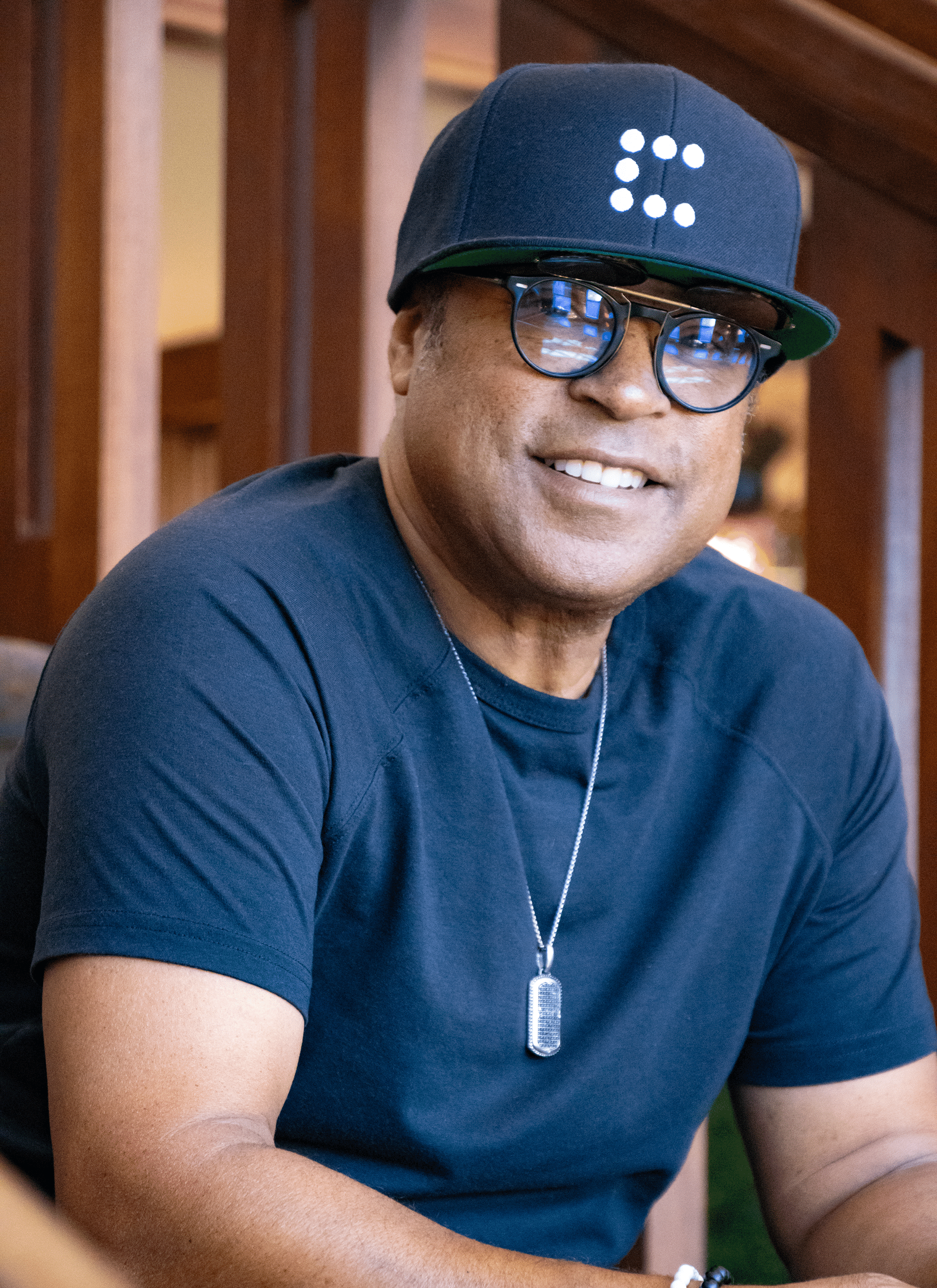
Code is Humphrey’s first effort at producing shoes outside the structure of Nike, but he’s not doing it alone. He has two investors, and help on the brand side from other Jordan alums Josiah Lake and Justin Taylor.
He’s already had to overcome a major hurdle in production—Code was originally meant to launch at the end of last year, but Humphrey had to pivot and find a new manufacturer. Now, he is ready to embark on the next chapter of a storied career. Here, Humphrey talks about his leaving Nike, his plans for Code, and how the skills he’s developed are helping him navigate the way forward. The conversation has been edited for length and clarity.
When did you decide that you wanted to start your own footwear brand with Code?
It was kind of interesting. I probably put things into play around 2021, shortly around the same time of my retirement from Nike and Jordan. And it was primarily built on just learnings. It took a 32-year career to realize while I had a great impact on sneaker culture and streetwear culture, I actually felt like I could have a greater impact with young creatives. The business has grown.
Back in the day it was like, just make cool shoes and let people buy them. But now the business has evolved way beyond that, and so having done various collaborations with folks, you realize that there's a ton of folks out there that have crazy creativity and love the world of fashion, and particularly love sneakers, and footwear in general. And so having worked with them, I was like, how cool would it be to give people a leg-up that have aspirations to exercise their entrepreneurial spirit in this world of footwear? And so this is one of the ways. Creating Code was one of the ways that I believe I can assist young creatives to do some of those things.
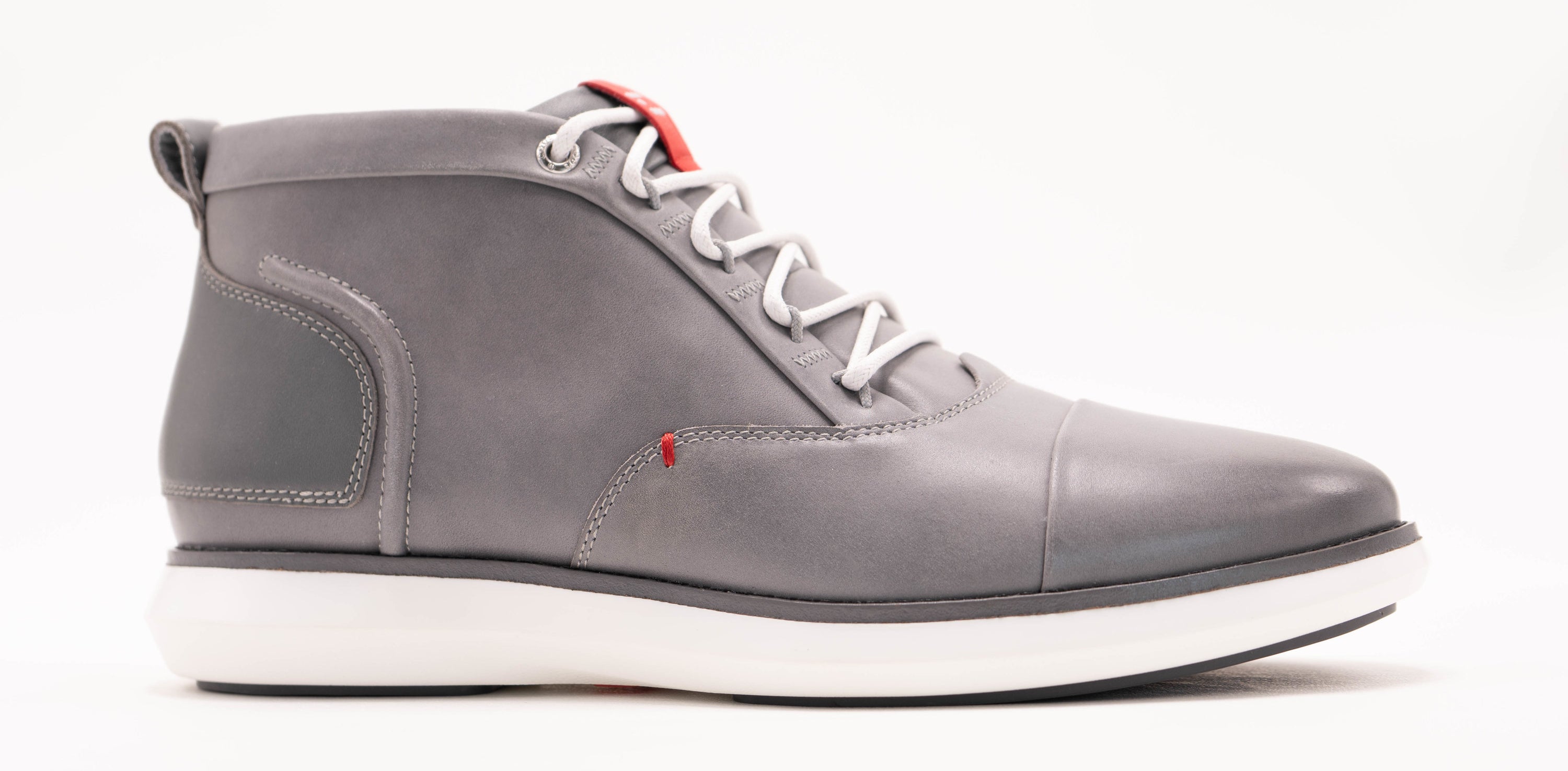
How do you find those names and discover that young talent?
Well, it's crazy because there's obviously the digital world we live in today where you can always stay connected to folks right away. So online checking people out, that's one way. Another way is just through the history, you just meet people that also travel in the same circles and you end up staying connected there. One thing, the whole “six degrees of separation” thing is very real. It might even be three degrees when it's all said and done.
So those are some of the ways, but other ways, just reaching out to folks. So one of the things that we're doing is there's an art center in downtown LA. Me being from the Southern California area, I felt like it was important to start where my roots were. And there's a school called Inner City Arts that we're going to be working with some young talented kids there. And so we specifically targeted that institution to do some things with, but we'll also do some things with other talented folks that I'm connected with, that I reach out with. And once we've launched the brand, there's a platform on our website that folks will be able to tap into and all of those good things. So there's multiple ways to stay connected, and we'll just utilize all of them.
You spent over 30 years at Nike. There was one moment in 2015 where it looked like you were ready to retire, and then they kept you around. Do you have a feeling that you can't really walk away from the footwear business?
[Laughs.] Maybe you're right. I didn't look at it that way. I honestly think I probably would've stayed connected to the footwear world, even if I would've left back then, just because it's been such a part of my life. It's allowed me to do things, meet people that I never would've imagined meeting or working with. But I think more than anything, it's allowed me to exercise my creativity in different ways. And so you're probably right. I probably would've stayed in the world some way, it would have sucked me back in in some way, shape, or form.

Did people try to advise you against starting Code? There's such a high barrier to entry when it comes to making shoes.
No. Ironically, it was kind of the opposite. I had people actually pushing me and when I would tell them what my thoughts were behind it, they were like, "Man, that's needed. You should do it." Ironically, I had some folks that were willing to invest in me to start my own footwear company back then, in 2015. But my mindset was so big because all I knew was a Fortune 500 company. I was like, man, I don't want to do what it takes to blow up a business that big.
Especially when you're trying to retire.
Yeah, exactly. At some point, I'm on the back nine trying to finish the play, and so I knew what it was going to take to do it, and I was like, nah, I'm not really ready to do that.
But as I got older, maybe slightly wiser, I realized the things that I have the ability to do. And like I said, paying it forward to this young generation that has a ton of entrepreneurs that are in the business these days, I feel like it doesn't have to be on a major Fortune 500 scale. I can do it at a smaller scale and still have huge impact. And so, being able to show people the necessities that it takes, not only is it you have to create a great design, you gotta have a development team that can execute. You got to understand that not everyone's going to interpret your two-dimensional design the proper way when it comes to making it three-dimensional.
What's typically a straight line on a two-dimensional piece of work becomes curved on a three-dimensional piece of work. And so being able to have the vision to see those things up front and try to eliminate some of the process of correcting the product all the time and getting people to understand that you got to look at it up front to get what you ultimately want on the back end. Just being able to share those types of things with folks I think is just priceless. And so really a big part of what I want to do.
All those tools that you have obviously give you a huge advantage. Is there a point in your career you remember where you feel like you mastered those things in terms of knowing how to make a sneaker happen?
No. I don't think you ever truly master it. Well, for me, what I realized is when I started to see things that the majority of the people didn't see, that's when I knew that I kind of had a little something. For me, it's just me.
What are some of those things?
There'd be certain designs that would be put in front of the group, and it could be something as simple as saying, "OK, the concept that we talked about is about being as fast and sleek as a motorcycle." And then I would say, "Well, this thing right here is big, bulky. We need to streamline this, and how can we streamline this?” Let's take the notion of this as a concept, whatever that might be, and then be able to share that. And then now people say like, "Ah, you're right. You get it."
But to be honest with you, I've never been the one that felt like I had to have all the answers. I believe that no one has all the answers. I think if you take the collective genius of a group of people, that's when you get to places that you don't even know you can go to.
So surrounding myself with designers that thought one way, product marketers that understood consumers in a little different way, being able to put all those folks in a room and then orchestrate it where we ultimately decide on a direction and go that direction and a design that really works was kind of my true skill set. So I didn't really know what I had until I really started to see things that were easy. And some of that, to be honest with you, just came with an experience. When you work for 32 years, you're going to see a lot of things that other people don't have access to. So it was just being able to tap into those things.
And for 30 years, that was my deal. I wanted to give people an opportunity to see things that they didn't know they were going to like. The average person, they don't know what they're going to like in the future. So in my old world, it was up to us, and especially as far out as we built product—a year and a half out—if you were trying to chase trends you were in trouble.
Are there things you remember making where you had that notion of “you're going to like this once you're ready for it” at Jordan or at Nike?
For me, again, it was a little bit difficult for me because I'm not afraid of being very different. So if you're giving people something that they already know, then yeah, OK, they're going to rock with you. But when you give them something that they don't know they're going to like and then you provide all the tools necessary to get them to like it then that's something else.
So a project like, obviously, Air Jordan 11 was—I can't tell you how many people crapped on that shoe when we took it out in focus groups. I mean, it was unbelievable. And the team, when we saw it, most of them were swirling around like crazy how amped and hyped we were, because it moved in a completely different direction.
I give Michael mad credit for just being sharp enough to want to push the envelope and do things differently because he actually wanted to do it on the AJ 9. We weren't even ready for it then.
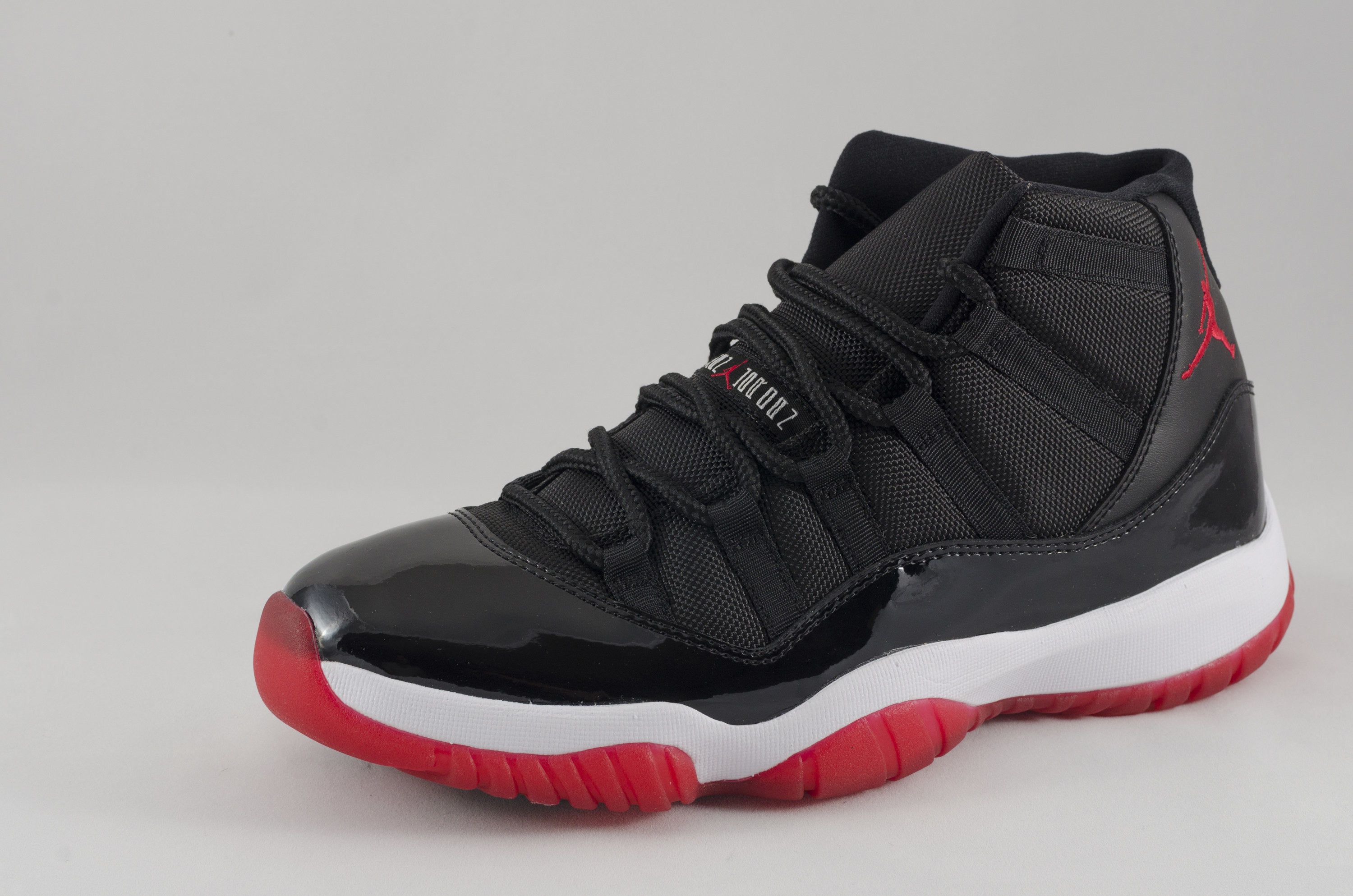
But a project like that to me was one that people knew the history of patent leather was just going on tuxedo shoes. You wouldn't put it on anything else. And so to put it on that shoe, and not only have it be aesthetically disturbing, but functionally relevant. You remember the days of looking at Sports Illustrated, and dudes are on the front of Sports Illustrated making a hard cut, and their foot is rolling off the foot frame. And we're like, how do we keep that from happening?
And the properties back then, especially using full grain leathers, that once you got them sweaty and perspiration caused the leather to stretch, all that stuff happened. Well, the nature of patent leather, it doesn't do that. So it became a functional element as well as an aesthetic that was very different. And so, like I said, back then, 90 percent of the people when we did focus groups said, "Take that shiny crap off the shoe and it'll be good." Well, today that shiny crap is one of the biggest shoes in the history of sneaker culture.
I gotta ask, have you shown MJ the shoes from Code yet?
Not yet. I'm going to meet with him on the 22nd or 23rd of this month, ironically, and I'm going to take them out there and let him check them out.
Some of the mission in terms of meeting a dress code while still being rooted in athletic footwear feels akin to what Jordan Brand did with the Two3 line. Am I right in thinking of it in that way?
Yeah, it is kind of similar to that. I didn't think of it that way, but you're right. That is very similar to what it would be. And again, that was way ahead of its time from an apparel and a footwear perspective
Who designed the Code shoes?
Me. And then I had help from one guy that used to work in the brand named Justin Taylor. He did some stuff. He worked on one of the shoes for us. But yeah, I did pretty much all of it.
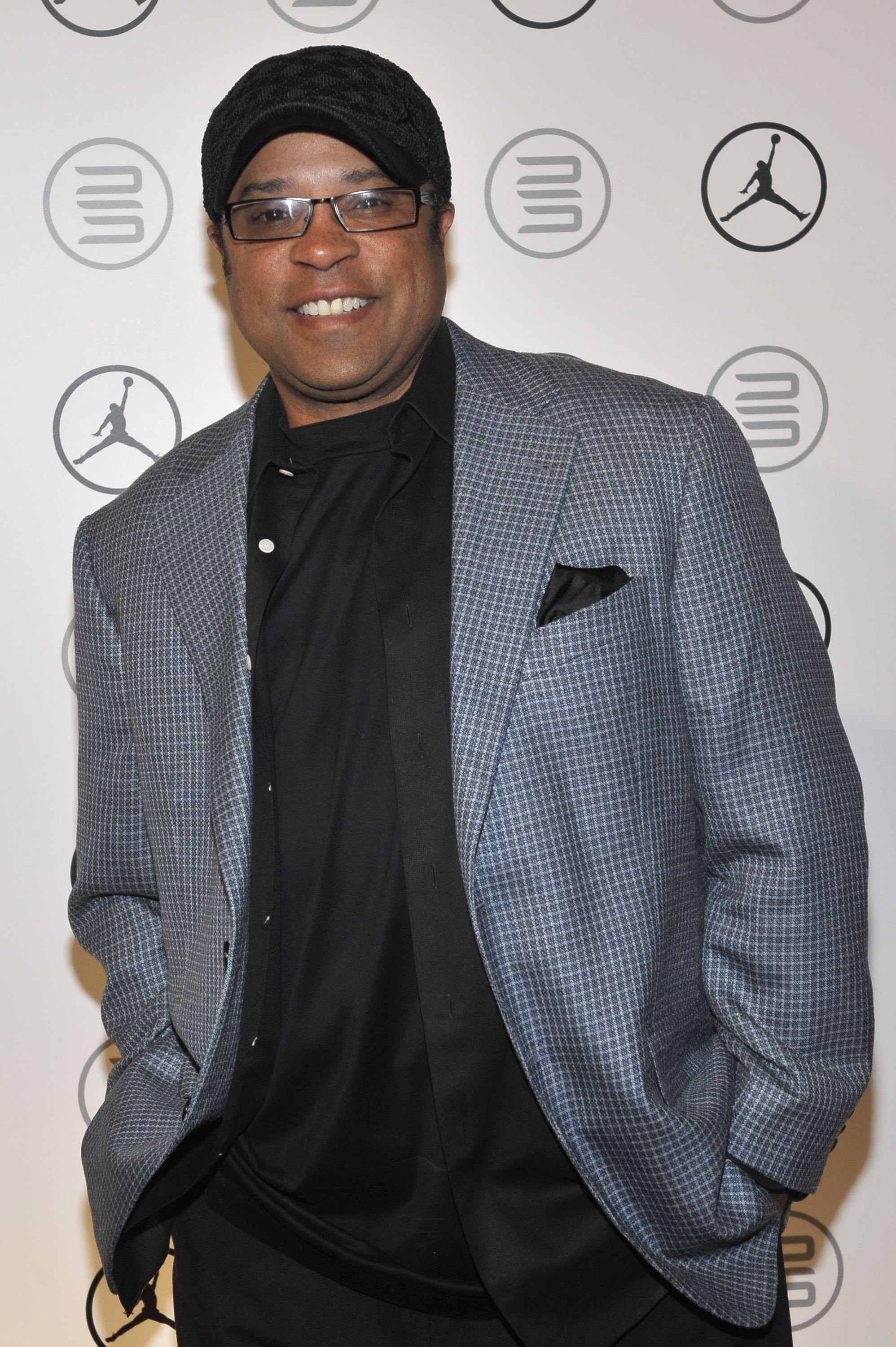
Is this a first for you in terms of actually designing a sneaker? I know you've done almost everything in the industry, but have you taken a shoe from start to finish like that before?
In the past I did a lot of golf stuff, and I did some simple stuff, easy stuff, like trimming them down, making mid-cuts low-cuts, and things of that nature. All the golf shoes in the past that [Jordan] has done, I literally did them all.
So it wasn't the first time. I mean, I've had the skills, but I never really...I didn't go to design school, so being able to sit down with the technical folks at the factories to make it come to life was the start of it.
How involved are you in the production aspect? Are you visiting the factories?
Oh my God, yes. Yeah, man, that's one of the things that when you don't have the millions of resources at your disposal you start to wear multiple hats. So I've been really deep into it, making sure things are right. And things are very similar in the sense of you design something and then you look to have it manufactured or samples developed, and interpretations in different countries are very different. And so you go over there and you massage it. You have challenges, especially when COVID was happening, trying to do things virtually is very difficult. And so ultimately to get it done right you got to kind of be present.
You don't have the same resources, but I feel like you still have those tools of knowing where to go to get the right footwear made.
Yep, you're right. But the difference is you don't have the same level of expertise because when you design this type of footwear versus sneakers, if you take this to a sneaker manufacturer, it’s gonna look like a sneaker. This has to be crafted differently. And so they don't necessarily have the same level of expertise to craft it the way you need it to be crafted to gain the respect of your consumer. So I had to do a lot of research.
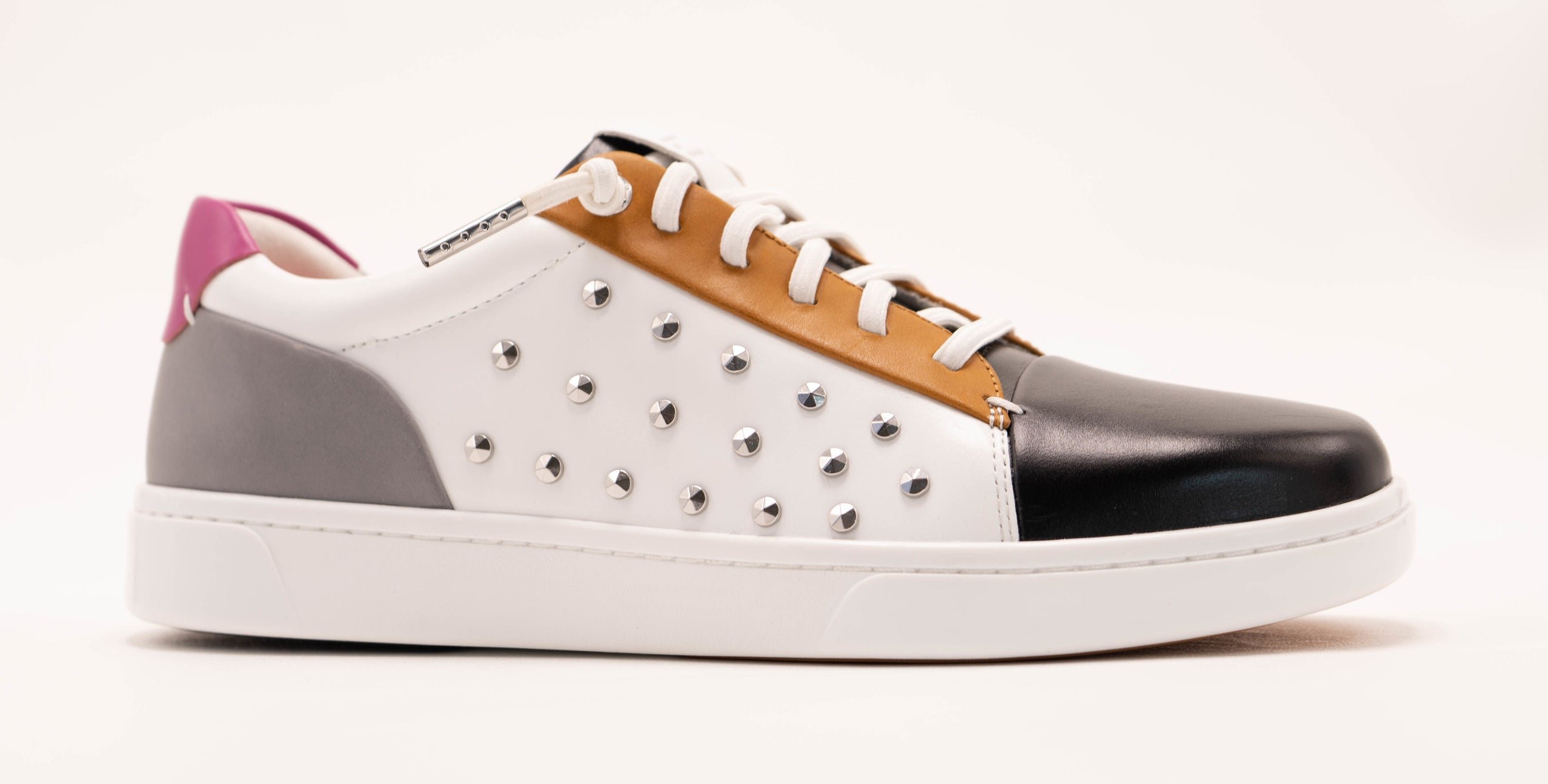
How big of an investment is this for you? Are there other investors? You had mentioned earlier when you had the idea before that people kind of wanted to back it. Where are you at with that?
Yeah, so I have two other business partners that we split the business up. And again, I reached out to folks who had expertise in certain areas. So one guy is a big finance operations guy that has some history in the sneaker world. He owned several retail shops back in the day, and then another guy who owned some factories. And so he has that skillset. And so those are a couple of business partners that are with me.
It seems like you easily could have ridden off into the sunset when you retired from Nike, but instead you're dedicating a significant amount of resources into building your own brand, which is not a safe bet at all. What made you realize you had to do more in footwear and that you wanted to take this risk?
For me, there have been several people that took a chance on me in this world, and I just felt like the least I could do going forward is to be able to pay it forward to the next generation. And honestly, that became more important than anything. And yeah, I'm going to take a swing at it and I might fail, but I'm in a position where I feel like I can help more people than even in my previous world.
It was funny, it was the same way, I think the big epiphany that I had was the company came to me at one point in my career and said, "Hey, look, we want you to take on this international GM role for Jordan."
And to their credit, we had been at the time, we were a business that was killing it. Everything that we did turned to gold. The report card for me was looking at consumers lining up in front of brick-and-mortar doors waiting to buy everything that we had, whatever size. I was like, shit that was a report card that said, “Grade A, job well done, team. We killed it.”
And then the company said that for us to get to the next level, I was going to have to take on a broader role that would help take the brand global. And in my mind at the time, I was like, this is a setup. Wait, you're going to give me three people to help rule the rest of the world with the brand? I'm like this has got to be a setup. I'm having fun doing all this other stuff, but now I've got to take on a role that deals with sales distribution and all kinds of aspects of the business, along with product.
Well, doing that changed my life because it allowed me to see things that I just didn't see before. I had a great impact on sneaker culture by creating some crazy cool stuff for consumers all over the world. I found myself connecting with people globally that loved hip-hop culture, loved sneaker culture, and being able to blend out that world or go to other parts of the world and share what we were doing in the US with other parts of the world because they had the same love and interest that we did in the US, was huge.
And literally, I helped create the Quai 54 event, the outdoor basketball tournament, which to me is the ultimate culmination of street culture and basketball culture when you have music, fashion, hip-hop all come together. It's the only event in the city of Paris where people of color have an opportunity to come together and just enjoy the culture. It's the only one. And so I realized the impact can be greater than just creating full footwear. Things like that, being able to experience those things now allowed me to see, OK, after a 32-year career, I have the chance to still impact these young creatives that are out there that nobody has a clue about. So that to me is a lot bigger than just a single shoe and worth taking the risk.

